This blog post reports on work-in-progress within the DfG course! The post is written by one of the two groups dealing with the Ministry of Environment’s brief on ‘Energy and maintenance in Finnish housing companies’. The group includes Ekaterina Perfilyeva from Aalto’s MA in Creative Sustainability (Business) program, Jutta Menestrina from Aalto’s MA in Creative Sustainability (Design) program, Marija Erjavec from Aalto’s MA in Graphic Design program, and Veikko Isotalo from Aalto’s MA in Information Networks & Political Science program.
Introduction weeks
The third week of the course started with lectures on empathic design. As the course has progressed, the tempo has been rising, and our enthusiasm with it. We are knee-deep in research and have piled up a great deal of relevant information. During the past weeks, we have developed a firmer grasp of the briefs and problems at hand, and some initials ideas on how to solve issues that have emerged from the research so far. Here we open up the first few weeks of the course and our experiences so far.
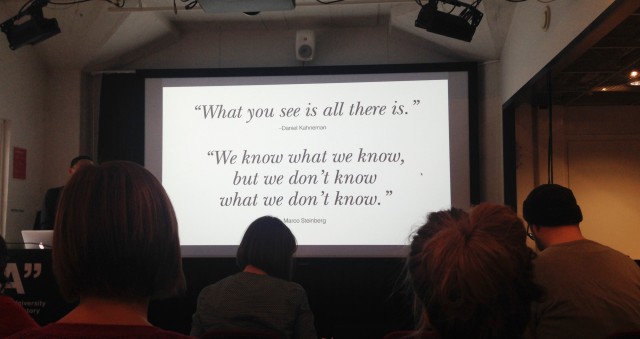
After an introductory lecture on Tuesday 23rd of February, where we got an overview of the course, it’s structure and teachers, we were right away divided into groups, and handed our first assignment. We were to conduct interviews of our group’s peers according to the given guidelines, and later on present what we learned about our teammates on the Media Factory’s stage. The purpose of the task was both to get to know our peers and to experience the challenges of summarising and presenting the interviewees answers. Each of us experienced being summarised and presented by each other, which we will keep in mind when interviewing stakeholders for the project research. It served as an important insight on how quickly the interviewer can misinterpret the interviewee by subconsciously introducing his or her own assumptions into the answers and how answers can be distorted by summarising them. Witnessing how the person conducting an interview can steer towards the types of answers that the interviewer expects was very insightful. It was also interesting from the point of view of the person being interviewed to hear how some answers left a lot of space for misinterpretation and how important and challenging clear communication can be.
The latter part of the day was focused on a co-design game, developed at Aalto University and BIT Research Centre. Anna Salmi, the project manager of the ATLAS strategic research project gave us a lecture on the uses of co-design games and introduced the ATLAS game which we were to use in a stakeholder workshop the week after. Co-design games can be efficiently used as conversation starters. They are an activity that lets all of the participants; the stakeholders as well as the designers of the game, gain valuable insights, which normally don’t emerge in plain conversations or even interviews. With the game on the table, and with all of the participants ideas and viewpoints equally valued, it serves as a platform for making connections and associations that light up new ideas and new ways of tackling the problem at hand.
During the rest of the week we dug into the briefs given by the ministries and gathered in-formation and ideas on how to best utilise the ATLAS game in the upcoming workshop. We organised our groups, set up communication channels, document sharing and distributed roles between our group members. We were soon ready to touch base with the experts; civil servants from the ministries and other stakeholders whose point of views on the problems we were interested in. We invited them to the workshop to get a better overview of the brief and to understand which issues are important to whom and how they perceive the tasks and challenges at hand. During the preparation we discussed which cards to use, how to dis-tribute the topics amongst groups dealing with the same briefs to get the best possible overview of the complex system we are dealing with and also play-tested the game be prepared for facilitation challenges. All of this, along with a delicious team tortilla dinner and pleasant company amounted to an intense, productive and also an enjoyable week.
Kick-Off workshop
29th February @Media Factory
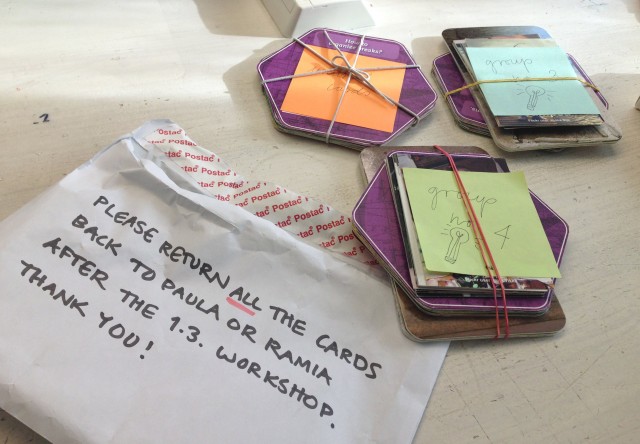
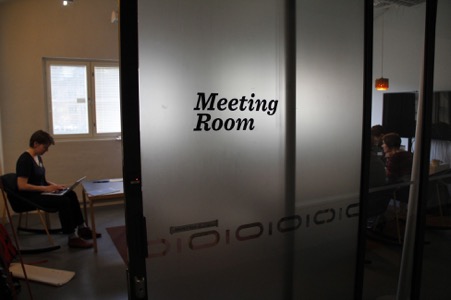
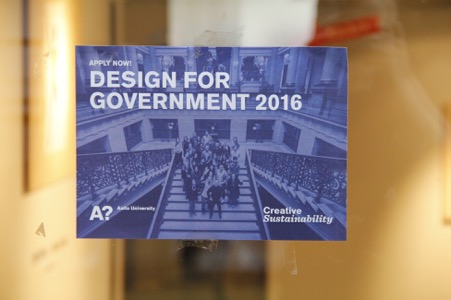
It was D-day, our first meeting with our stakeholders – the experts who we were keen to learn from. Needless to say we were nervous, as we prepared the rooms, the refreshments, went through final preparations and rehearsals of the game. We received final tips and input from our teachers and were ready to go.
In our case, the conversations with the stakeholders went on very naturally. The game served it’s purpose to keep the conversation going in a direction that helped to shed light on areas we realised we need to explore more. In our case we learned a great deal about the communication problems between ministries and the residents in private housing companies, about the existing information and knowledge of the buildings not being passed on and the lack of knowledge on how to better up keep the buildings. We are grateful to the participants with whom we conducted the workshop with for a great and active participation and we are hopeful they might have gained new insights as well.
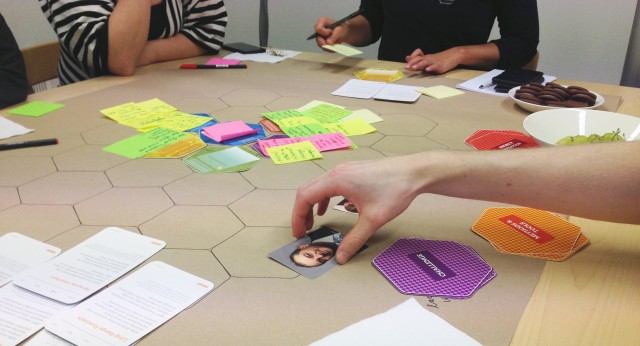
After the workshop we had a debriefing within our group and with teachers. We briefly discussed our findings, key insights, observations and ideas about further steps. Over the course of the following week we structured the insights, wrote a detailed summary of the workshops to share within our group, read through many articles and researched the existing tools for reporting the maintenance and renovation plans of private housing. We mapped out the stakeholders, motivations, power relations and interests to get a better overall picture of the problem.
Empathic Design lectures
7th March @Media Factory
Our task for the third week was to present our findings from the workshops, our research and action plan. After a discussion on the presentations, all the participants in the course provided feedback with compliments on what was done well, further suggestions on what to research and critical takes on what to improve.
DfG teacher and design researcher Juha Kronqvist walked us through the principles of empathic design research. Amongst other things many were surprised to learn that empathy and sympathy are something very different, which is nicely illustrated in this RSA short video.
Empathy is, as Jane Fulton Suri puts it: “The ability to step into someone else’s shoes and to understand them through their experiences.” which is something we will need to keep in mind at least during the concept search phase.
We were taught about the importance of research within the context and having a widened understanding of the people’s experience to uncover explicit and tacit needs, as well as involving them in the design process to better understand their needs and perspectives. We were then encouraged to develop a clear research problem, assess which methods would be most useful and to come up with a detailed research plan in order to gather relevant in-formation for successfully tackling the research question.

We have laid out our research plan in our group’s meeting the next day and are now in full execution mode with first interviews being conducted in the next few days. All we can say so far is: “Off we go!”.
The DfG course runs for 14 weeks each spring – the 2016 course has now started and runs 22 Feb to 28 May. It’s an advanced studio course in which students work in multidisciplinary teams to address project briefs commissioned by governmental ministries in Finland. The course proceeds through the spring as a series of teaching blocks – Empathic Design, Systems Thinking and Behavioral Insight – in which various research and design methods are applied to addressing the project briefs. Blog posts are written by student groups, in which they share news, experiences and insights from within the course activities and their project development. More information here about the DfG 2016 project briefs. Hold the date for the public finale 08:30-12:30 on Tues 24 May!

